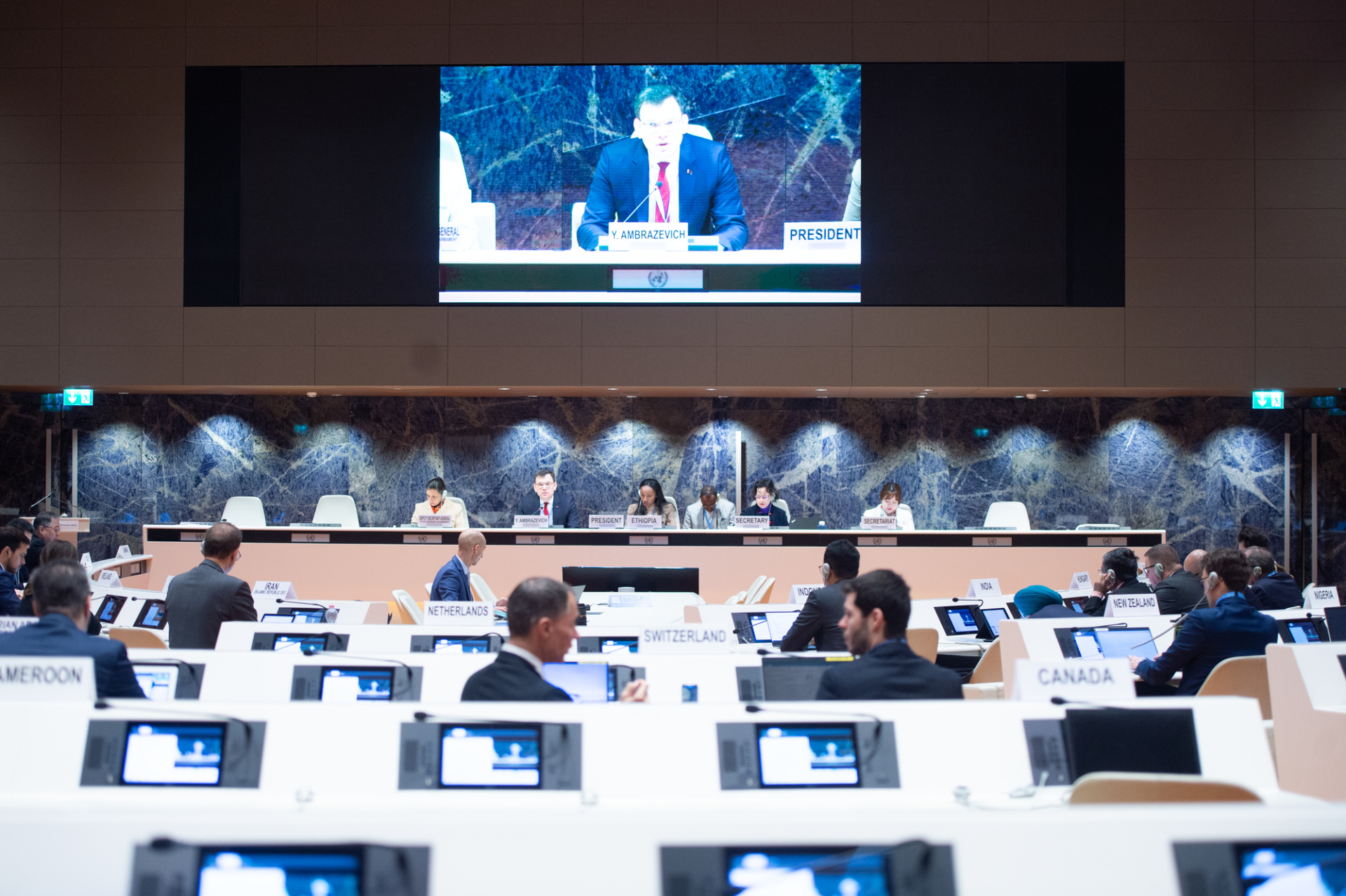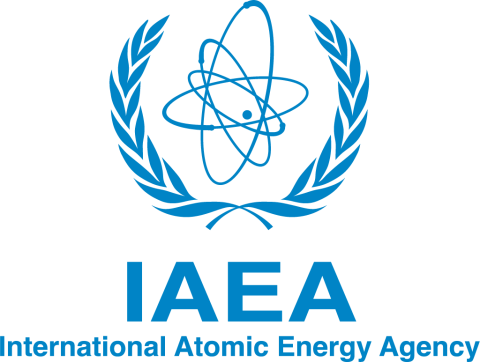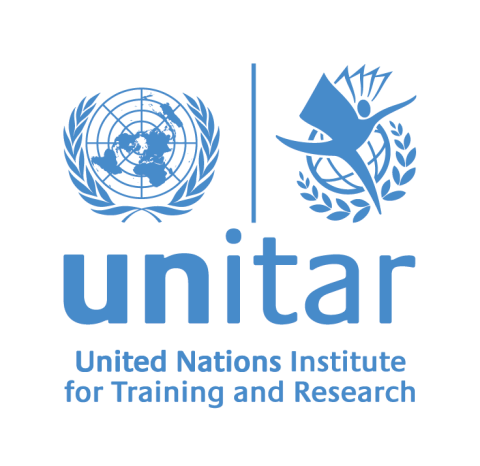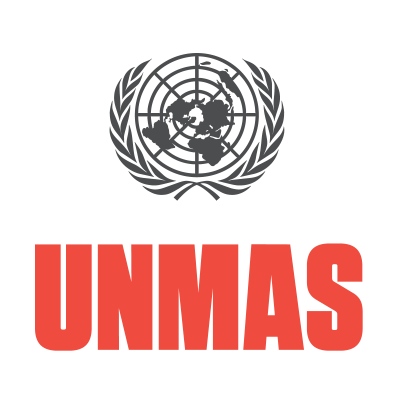
Fil d'Ariane
- Cette page a été traduite à l'aide de la traduction automatique. Lire la suite.
La Conférence du désarmement
La Conférence du désarmement a été créée en 1979 en tant qu'instance multilatérale unique de négociation sur le désarmement au sein de la communauté internationale. L'actuelle Directrice générale de l'ONU à Genève, Tatiana Valovaya, est également Secrétaire générale de la Conférence du désarmement ainsi que Représentante personnelle du Secrétaire général de l'ONU auprès de la Conférence.
Lors de leurs réunions, qui ont lieu trois fois par an, les 65 États membres de la Conférence se concentrent actuellement sur les sujets suivants :
- cessation de la course aux armements nucléaires et désarmement nucléaire
- prévention de la guerre nucléaire, y compris toutes les questions connexes
- Prévention d'une course aux armements dans l'espace
- des accords internationaux efficaces pour garantir les États non dotés d’armes nucléaires contre l’emploi ou la menace d’emploi d’armes nucléaires
- nouveaux types d’armes de destruction massive et nouveaux systèmes de telles armes ; armes radiologiques
- programme global de désarmement
- transparence dans le domaine de l'armement

Conventions et traités basés à Genève
La Convention sur les mines antipersonnel (CCMP) est le traité qui interdit, pour des raisons humanitaires, l'emploi, la mise au point, la production, le stockage, la conservation ou le transfert de mines antipersonnel. Elle vise ainsi à mettre un terme aux souffrances et aux pertes en vies humaines causées par les mines antipersonnel, qui tuent ou mutilent chaque année des milliers de civils innocents, entravent le développement économique et la reconstruction, et empêchent le rapatriement des réfugiés et des personnes déplacées à l'intérieur de leur propre pays.
La Convention sur les armes biologiques (CAB) , premier traité multilatéral de désarmement interdisant la production et l'utilisation d'une catégorie entière d'armes, est le fruit d'efforts prolongés de la communauté internationale. Toutes les réunions de la CAB se tiennent à Genève et sont organisées par l'Unité d'appui à la mise en œuvre de la CAB, qui relève du Bureau des affaires de désarmement de Genève.
La Convention sur les armes à sous-munitions a été conclue par la Conférence diplomatique de Dublin en 2008. Les tâches accomplies par le Secrétaire général de l'ONU sont prescrites par la Convention et les résolutions pertinentes de l'Assemblée générale. Il s'agit notamment de la collecte et de la diffusion des rapports nationaux de transparence, de la facilitation de la clarification du respect des dispositions et de la convocation des réunions des États parties et des conférences d'examen.
La Convention sur certaines armes classiques (CCAC) est un instrument clé du droit international humanitaire et, avec ses cinq protocoles, vise à interdire ou à restreindre l’utilisation de certains types d’armes qui ont des effets indiscriminés sur les civils ou causent des souffrances inutiles aux combattants. Depuis 2016, un groupe d’experts gouvernementaux (GGE) de la CCAC examine les éventuels défis posés par les nouvelles technologies dans le domaine des systèmes d’armes létaux autonomes (SALA). Les réunions de la CCAC se tiennent à Genève et sont organisées par l’Unité d’appui à la mise en œuvre de la CCAC du Bureau des affaires de désarmement de Genève.
Dans le domaine des armes légères et de petit calibre (ALPC) et du Traité sur le commerce des armes (TCA) , la Branche de Genève assure à la fois la liaison avec le Bureau des affaires de désarmement à New York ainsi qu'avec les organisations non gouvernementales et internationales basées à Genève, et représente le Bureau lors des réunions connexes tenues à Genève.
L’ONU Genève accueille également d’autres réunions liées aux instruments de désarmement, telles que les sessions du Conseil consultatif pour les questions de désarmement , le Comité préparatoire des conférences d’examen du Traité sur la non-prolifération des armes nucléaires (TNP) , des groupes d’experts et des séminaires.
Recherche sur le désarmement
La base de connaissances interne de l’ONU sur les questions de désarmement est en grande partie constituée par l’Institut des Nations Unies pour la recherche sur le désarmement (UNIDIR), basé à Genève :
- Comment utiliser l’énergie nucléaire tout en réduisant le risque d’utilisation d’armes nucléaires ?
- Quel rôle joue l’intelligence artificielle dans les conflits et les guerres, quel rôle pourrait-elle potentiellement jouer dans le désarmement ?
- Quelles sont les implications en matière de sécurité liées à notre exploration et à notre utilisation croissantes de l’espace ?
Toutes ces questions sont abordées par l’équipe de chercheurs de l’UNIDIR. Les résultats sont publiés et partagés avec les États membres et d’autres parties prenantes lors de sessions de formation et de conférences mondiales.

Contacter UNODA Genève
Organisations travaillant sur le désarmement
L'AIEA est le centre mondial de coopération dans le domaine nucléaire. Elle a été créée en 1957 en tant qu'organisation mondiale "Des atomes pour la paix" au sein de la famille des Nations Unies. L'Agence travaille avec ses États membres et de multiples partenaires dans le monde entier pour [...]
L'Institut interrégional de recherche des Nations Unies sur la criminalité et la justice (UNICRI) a été créé en 1968 conformément à la résolution 1086 B (XXXIX) du Conseil économique et social de 1965, qui demandait instamment une expansion des activités des Nations Unies en matière de prévention du [...]
L’Institut des Nations Unies pour la recherche sur le désarmement (UNIDIR) — un institut autonome au sein des Nations Unies — mène des recherches sur le désarmement et la sécurité dans le but d’aider la communauté internationale dans sa réflexion, ses décisions et ses efforts en matière de [...]
En tant qu'organe du système des Nations Unies dédié à la formation, l'Institut des Nations Unies pour la formation et la recherche (UNITAR) fournit des solutions d'apprentissage innovantes aux individus, aux organisations et aux institutions afin d'améliorer la prise de décision au niveau mondial [...]
L'UNMAS collabore avec 11 autres départements, agences, programmes et fonds des Nations Unies pour assurer une réponse efficace, proactive et coordonnée aux problèmes des mines terrestres et des restes explosifs de guerre, y compris les armes à sous-munitions. L'UNMAS a été créé en 1997 pour servir [...]
Le Service de Genève du Bureau des affaires de désarmement assiste les États Membres à soutenir leurs efforts de désarmement, de maîtrise des armements et de non-prolifération visant à atteindre l'objectif d'un désarmement général et complet sous un contrôle international strict et efficace.
Le [...]
L'Office des Nations Unies contre la drogue et le crime (ONUDC) a pour mandat de rendre le monde plus sûr face aux drogues, au crime organisé, à la corruption et au terrorisme. L'organisation s'engage à assurer la santé, la sécurité et la justice pour tous en s'attaquant à ces menaces et en [...]







